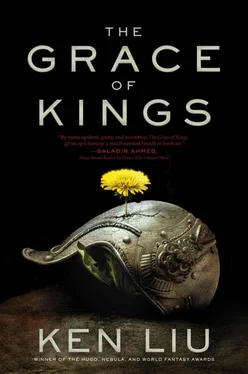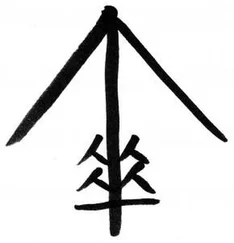“What kind of counsel is this?” said the red cruben. “Such a path is neither fair nor just. I have come to admire him after so many days of fighting.”
“I’m attached to you,” said the remora. “I live off the detritus that drifts from your maw after you feed. I have traveled the four seas only by dint of your power. If you win, I’ll have more to eat, and perhaps I’ll puff up and show off my colorful fins to the other fish, but if you lose, I’ll just find another great fish to attach to. Though I’ll benefit from your victory, I’ll not share your dishonor — the memory of the sea is rarely kind to great creatures who blame their moral failing on those who but serve and advise at their pleasure.”
The cruben was surprised. “So you admit that you risk nothing, and I everything. Why should I listen to you?”
“Because I live so low, hanging from your belly, my duty isn’t to be your conscience, but to think thoughts you dare not think, devise plans you dare not utter. When you find a great cruben, a lord of the sea, whose scales are shiny, whose hide is smooth, whose muscles bulge with vigor and health, you may be sure that you’ll find a great many remoras attached to him gorged on filth. A cruben whose remoras are afraid to get dirty will not live long or find victory.”
And the red cruben listened to the remora and became the lord of the four seas.
Luan Zya closed the book and laughed bitterly. Was this how he’d be remembered by history?
Then he recalled the moonlight falling on the ruins in Ginpen and the song of the children of Haan. He remembered the promise he made to his father and felt again the restlessness in his soul.
The more perfect the ideals, the less ideal the methods.

Kuni’s army pulled back from Dimushi, toward Pan, which Cogo Yelu had rebuilt. Kuni’s family had been sent on ahead. The agreement was for both sides to not station troops within fifty miles of the Liru River.
“Have you thought about when we should attack?” Luan asked.
They were riding in Kuni’s carriage. The king was reviewing reports of harvests and tax collections and thinking about how to administer his vast new realm now that the war was over. All those old records from the Xana Imperial Archives saved by Cogo Yelu would come in handy, he realized, and he was again thankful for his prime minister’s foresight. Luan Zya’s question caught him off guard.
“Attack?”
Luan took a deep breath. “You don’t really think this peace treaty is the end, do you?”
Kuni looked at him. “The war has gone on long enough. Mata and I, neither of us can overcome the other. I’ve put my seal on the document. It is done.”
“A seal is only a mark on a piece of paper, with exactly as much force as you are willing to give it. The Cocru army has run out of provisions, and now they’ve scattered across Cocru and let down their guard. We, on the other hand, remain well stocked, thanks to Cogo’s efforts. This is the best opportunity to attack them from behind and hit them with everything we have.”
“Then I’ll be remembered by history as a great betrayer. Mata’s accusation against me will be carved in stone, made true by my own act. What you counsel is against all the laws of war. I will have no honor left.”
“The judgment of history cannot be ascertained from up close. You see the condemnation of the people of this generation, but you cannot foresee how their descendants will view your deeds in the future. If you do not attack now and end this war, the killing will never stop. In another ten years, or twenty, Dasu and Cocru will again face each other on the battlefield, blood will again stain the Liru River, and the people of Dara will again suffer and die.”
Kuni thought of the people of Pan, whom he had abandoned once in the hope of preserving Mata’s friendship. Their cries as the streets filled with blood still haunted him in dreams.
“You will have sacrificed the lives of the people for personal honor, an empty word,” Luan said. “That seems to me a most selfish act.”
“Is there no room for mercy? No sympathy among gods or men?”
“Mercy for your foes, my king, is the same as cruelty to your friends.”
“That sort of logic, Luan, could become the salve and loincloth for all tyrants.”
“Queen Gin has always argued that if one goes to war, one should do all one can to win. A knife is not malicious merely because it is sharp, and a plot is not evil merely because it is effective. All depends on the wielder. The grace of kings is not the same as the morals governing individuals.”
Kuni did not respond.
“If you do not make use of every advantage given to you, the gods will condemn you for your error.”
The treaty felt heavy in Kuni’s hands. Would the lives of the people feel even heavier?
I think I wield power, Kuni thought, but perhaps it is Power that wields me.
“Summon Mün Çakri and Than Carucono.”
Kuni sighed in resignation and tore the paper into pieces.
In a minute, the pieces had disappeared in the wind, like words spoken and then forgotten.

Mata Zyndu received the news of Kuni Garu’s betrayal at Rana Kida, a wall-less town near a hill in the Porin Plains, still miles from Çaruza.
Kuni’s army had crossed the Liru, and Théca Kimo’s army had landed at Canfin. In the east, Mazoti’s men had broken through the defenses in the hills at the southern end of the Wisoti Mountains. Fifty thousand Dasu soldiers and allies were now closing in on Mata.
Mata had already sent the bulk of his army in scattered detachments to garrison the towns all across Cocru, leaving only five thousand riders with him.
“This is just like Wolf’s Paw and Zudi,” Ratho said. “Though they outnumber us ten to one, we will yet prevail.”
“Ah, my brother,” Mata whispered. And he tore the treaty in his hand into pieces, scattering them like moths in the chill wind of late autumn.

The Dasu army swept over Cocru, a sickle swinging across fields of wheat. It was winter, and the hard pounding of their horses’ hooves could be heard for many miles all around the frozen land. Bypassing the Cocru garrisons in their well-defended cities, Kuni’s forces aimed straight for Rana Kida, stretching their supply lines as long as kites straining in a howling gale.
Mata mustered his troops on top of the hill near Rana Kida. Kuni, Théca, and Gin’s armies converged and surrounded the hill tightly like the hoops of a barrel. Gin Mazoti was appointed commander-in-chief. This would be her masterpiece, her greatest battle.
Mounts Fithowéo and Kana both erupted, and a snowstorm that was beyond anything in living memory raged over the battlefield. High winds shifted direction from moment to moment, and snow fell in great clumps, mixed with hail. Even the gods seemed to be at war.
Day and night, the hegemon ordered his men to try to break through Gin Mazoti’s encirclement, but time and again, Mazoti’s troops forced them to retreat back up the hill. The constant snow and whipping wind made it impossible to use airships, and the ground was too frozen to dig deep holes for palisades or other fortifications, so Mazoti had to rely on infantry formations that held Mata back by sheer number of bodies.
When Mata retreated, Mazoti ordered waves of Dasu men to charge up the hill. Always, they were repulsed and left many bodies behind. But Mazoti could afford to lose plenty of bodies. She would not give Zyndu’s men a chance to rest, to sleep. She would grind them down.
Читать дальше













